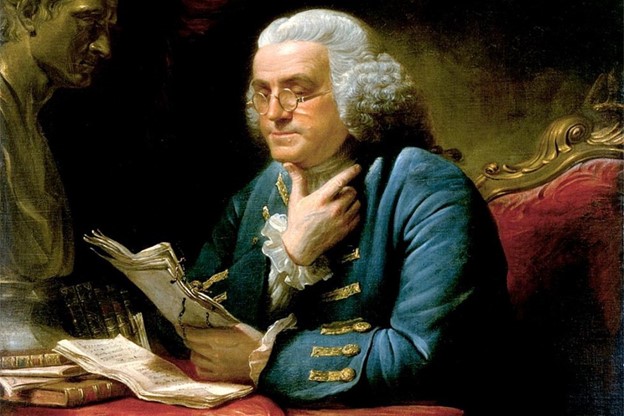
To listen to this reflection as a podcast, click here.
When America’s ragtag revolutionary army faced one of its darkest moments, George Washington brought out his secret weapon.
His eyeglasses.
Things had gone unaccountably well for the colonists in their struggle against the British army, the world’s most elite fighting force. By the spring of 1783, treaty negotiations would soon guarantee America’s independence.
But the officers of the colonial army were, as one historian put it, “tired, bloody, homesick, and unpaid.” The “unpaid” part was what really stuck in their collective craw. There was talk of mutiny. Unless the Continental Congress came up with the funds they had been promised, these disgruntled veterans would throw the fledgling country into chaos.
Washington was horrified. For seven years, he had somehow weathered crippling shortages of food, money, weapons, and public support. Now it seemed everything might be thrown away.
The 6 foot-4-inch general stood before his officers. As he had done many times in the past, he appealed to the virtues of public duty and honor.
Then he reached into his pocket and retrieved a piece of paper on which he had written some additional remarks. He stared at it, then took out a pair of glasses and said, “Gentlemen, you will permit me to put on my spectacles, for I have not only grown gray but almost blind in the service of my country.”
Tears appeared in the eyes of the officers. Some wept openly. Just like that, all the momentum for a mutiny vanished.
What in the world had just happened?
In an era that valued carefully scripted public displays of strength and decorum, Washington had made himself vulnerable. Few people wore eyeglasses in colonial America. Those who did tended to hide the fact, since physical frailties were associated with weakness. But this commander was saying to his men, “I’m tired and have suffered, too.” They immediately rallied to his side.
Washington went on to successfully lobby Congress for five years of full pay for his officers.
On December 4, 1783, he once again huddled with his senior military colleagues, this time at Fraunces Tavern in lower Manhattan. It was widely rumored that he was on the verge of declaring a military coup and establishing himself as the supreme leader of a new world order.
That’s what conquerors do. They typically promise they are fighting for “liberation” and for “the people,” but once they get a taste of real power, they become exceedingly reluctant to step down.
Think of Alexander the Great, Julius Caesar, Genghis Khan, Napoleon, and the dreary list of dictators who dominated the 20th century. Having vaulted to a place of absolute authority, they refuse to let go, thereby making a capital mess of things.
Now Washington was being given the chance to become the first American emperor. Many hoped he would do so.
Instead, he walked away.
Washington quietly and calmly told his officers that he was going home. He later pointed out that they had just fought a war to be delivered from King George III. He had no intention of subjecting them to another King George.
No one was surprised when, five years later, he was elected (despite his reluctance) to serve as America’s first president, and then re-elected to a second term. That’s when Washington pulled a second stunner. He retired altogether from public life, even though he almost certainly could have become, by public acclamation, Ruler for Life.
He was hailed around the world as the American Cincinnatus – a high compliment.
The Roman consul Cincinnatus was plowing his fields in 458 B.C. when members of the Senate rushed to his farm and begged him to save the city from invasion. Cincinnatus became a dictator, defeated Rome’s enemies, then promptly returned to his farm. He did the same thing again in 439 B.C. – serving the common good, then hanging up his toga forever.
A group of Americans formed the Society of the Cincinnati in 1783 in order to promote selfless service and public virtue.
They even lent their name to a hamlet on the north side of the Ohio River. That village grew to become a metropolis where, in the spirit of Cincinnatus, the local NFL franchise every year gladly turns down the opportunity to win a Super Bowl so that another city might experience the joy of being champions.
Back in England, King George III was impressed. When told that Washington intended to step down, he said, “If he does that, he will be the greatest man in the world.”
In point of fact, that’s exactly what the real greatest man in the world had done some eighteen centuries earlier.
The apostle Paul writes, “Think of yourselves the way Christ Jesus thought of himself. He had equal status with God but didn’t think so much of himself that he had to cling to the advantages of that status no matter what. Not at all. When the time came, he set aside the privileges of deity and took on the status of a slave, became human! Having become human, he stayed human. It was an incredibly humbling process. He didn’t claim special privileges. Instead, he lived a selfless, obedient life and then died a selfless, obedient death—and the worst kind of death at that—a crucifixion” (Philippians 2:5-8, The Message).
Walking away from absolute power and all of its perks, for the sake of the common good, is the ultimate test of leadership.
When we become convinced that we don’t have to be in control of everything – whether at home, at work, or in the community – we have a real shot at experiencing the kind of servanthood that Jesus modeled for us.
And who knows? We may even end up on the one-dollar bill.
